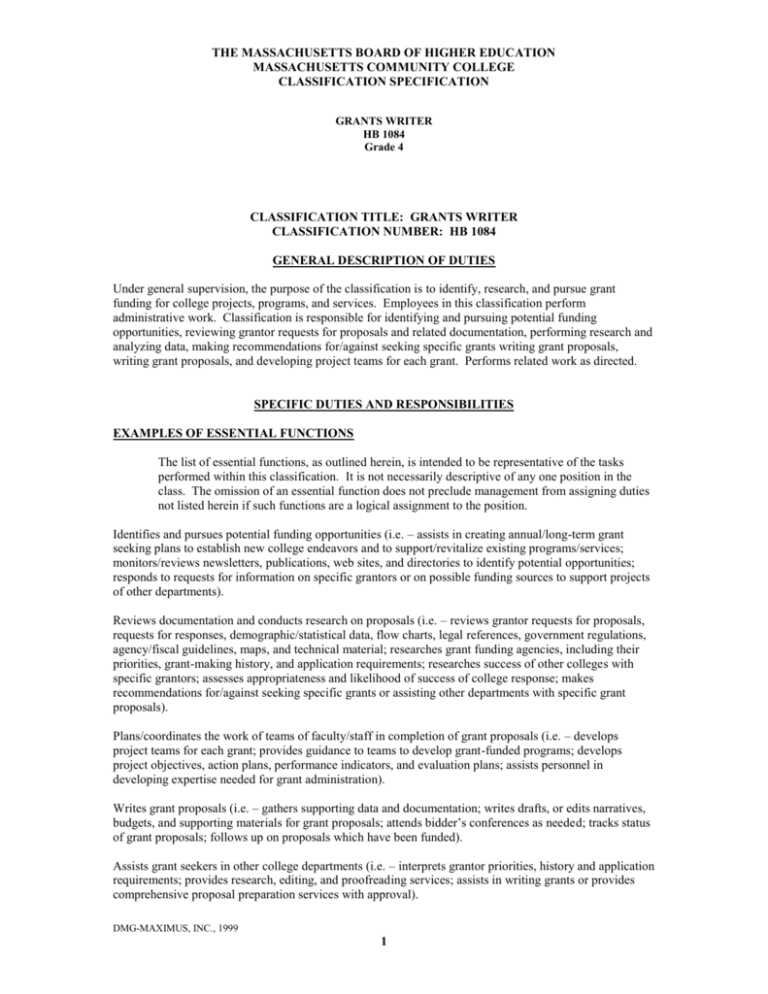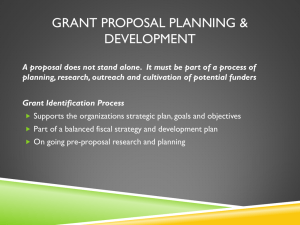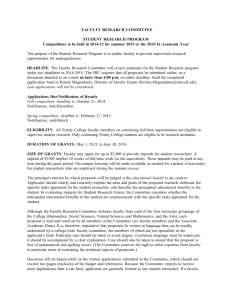Grants Writer - Massachusetts Department of Higher Education
advertisement

THE MASSACHUSETTS BOARD OF HIGHER EDUCATION MASSACHUSETTS COMMUNITY COLLEGE CLASSIFICATION SPECIFICATION GRANTS WRITER HB 1084 Grade 4 CLASSIFICATION TITLE: GRANTS WRITER CLASSIFICATION NUMBER: HB 1084 GENERAL DESCRIPTION OF DUTIES Under general supervision, the purpose of the classification is to identify, research, and pursue grant funding for college projects, programs, and services. Employees in this classification perform administrative work. Classification is responsible for identifying and pursuing potential funding opportunities, reviewing grantor requests for proposals and related documentation, performing research and analyzing data, making recommendations for/against seeking specific grants writing grant proposals, writing grant proposals, and developing project teams for each grant. Performs related work as directed. SPECIFIC DUTIES AND RESPONSIBILITIES EXAMPLES OF ESSENTIAL FUNCTIONS The list of essential functions, as outlined herein, is intended to be representative of the tasks performed within this classification. It is not necessarily descriptive of any one position in the class. The omission of an essential function does not preclude management from assigning duties not listed herein if such functions are a logical assignment to the position. Identifies and pursues potential funding opportunities (i.e. – assists in creating annual/long-term grant seeking plans to establish new college endeavors and to support/revitalize existing programs/services; monitors/reviews newsletters, publications, web sites, and directories to identify potential opportunities; responds to requests for information on specific grantors or on possible funding sources to support projects of other departments). Reviews documentation and conducts research on proposals (i.e. – reviews grantor requests for proposals, requests for responses, demographic/statistical data, flow charts, legal references, government regulations, agency/fiscal guidelines, maps, and technical material; researches grant funding agencies, including their priorities, grant-making history, and application requirements; researches success of other colleges with specific grantors; assesses appropriateness and likelihood of success of college response; makes recommendations for/against seeking specific grants or assisting other departments with specific grant proposals). Plans/coordinates the work of teams of faculty/staff in completion of grant proposals (i.e. – develops project teams for each grant; provides guidance to teams to develop grant-funded programs; develops project objectives, action plans, performance indicators, and evaluation plans; assists personnel in developing expertise needed for grant administration). Writes grant proposals (i.e. – gathers supporting data and documentation; writes drafts, or edits narratives, budgets, and supporting materials for grant proposals; attends bidder’s conferences as needed; tracks status of grant proposals; follows up on proposals which have been funded). Assists grant seekers in other college departments (i.e. – interprets grantor priorities, history and application requirements; provides research, editing, and proofreading services; assists in writing grants or provides comprehensive proposal preparation services with approval). DMG-MAXIMUS, INC., 1999 1 THE MASSACHUSETTS BOARD OF HIGHER EDUCATION MASSACHUSETTS COMMUNITY COLLEGE CLASSIFICATION SPECIFICATION GRANTS WRITER HB 1084 Grade 4 Assists dean in organizing new college projects (i.e. – enlists internal/external participants; forges agreements among internal/external parties on the design, organization, and implementation of projects; identifies/recommends program methods/innovations successful at other colleges). Performs administrative tasks associated with department activities (i.e. – performs research, compiles/analyzes data, and identifies trends; prepares grant applications, grants, technical material, statistical analyses, flow charts, budget, newsletters, presentations, reports, forms, and general correspondence; receives or refers to requests for proposal/response, surveys, grants, newsletters, flow charts, statistical data, publications, procedures, guidelines, directories, manuals, and reference materials; processes documentation within designated timeframes to meet deadlines; operates a computer and utilizes word processing, spreadsheet, database, Internet, or other software programs). Interacts with various agencies/individuals (i.e. – attends meetings; informs others of activities and opportunities available through the grants office; promotes the college’s reputation and needs with potential donors; communicates with supervisor, employees, other departments, students, faculty members, other educational facilities, business leaders, funding agencies/foundations, government agencies, the public outside agencies, and other individuals to coordinate activities, review status of work, exchange information, or resolve problems). Maintains professional knowledge in applicable areas (i.e. – maintains a working knowledge of assigned area; researches new trends and advances in the profession; reads professional literature; attends workshops and training sessions). MARGINAL FUNCTIONS While the following tasks are necessary for the work of the unit, they are not an essential part of the purpose of this position and may also be performed by other unit members. Performs miscellaneous tasks (i.e. – compiles/collates information; makes copies; maintains files; proofreads written materials; provides backup coverage involving word processing and answering telephones as needed; drops off or picks up materials to/from other agencies). Performs related duties as directed. MINIMUM TRAINING AND EXPERIENCE Bachelor’s degree in Education, Curriculum Development, Public Administration, Business Administration, or closely related field; with three (3) years experience and/or training that includes grant writing, research, and project planning/development; or an equivalent combination of education, training, and experience. SPECIAL REQUIREMENTS This classification has no special requirements. PERFORMANCE APTITUDES DMG-MAXIMUS, INC., 1999 2 THE MASSACHUSETTS BOARD OF HIGHER EDUCATION MASSACHUSETTS COMMUNITY COLLEGE CLASSIFICATION SPECIFICATION GRANTS WRITER HB 1084 Grade 4 Data Utilization: Requires the ability to evaluate, audit, deduce, and/or assess data using established criteria. Includes exercising discretion in determining actual or probable consequences and in referencing such evaluation to identify and select alternatives. Human Interaction: Requires the ability to apply principles of persuasion and/or influence over others in coordinating activities of a project, program, or designated area of responsibility. Equipment, Machinery, Tools, and Materials Utilization: Requires the ability to operate, maneuver and/or control the actions of equipment, machinery, tools, and/or materials used in performing essential functions. Verbal Aptitude: Requires the ability to utilize a wide variety of reference, descriptive, advisory and/or design data and information. Mathematical Aptitude: Requires the ability to perform addition, subtraction, multiplication and division; ability to calculate decimals and percentages; may include ability to perform mathematical operations involving basic algebraic principles and formulas, and basic geometric principles and calculations. Functional Reasoning: Requires the ability to apply principles of influence systems, such as motivation, incentive, and leadership, and to exercise independent judgment to apply facts and principles for developing approaches and techniques to resolve problems. Situational Reasoning: Requires the ability to exercise judgment, decisiveness and creativity in situations involving evaluation of information against measurable or verifiable criteria. ADA COMPLIANCE Physical Ability: Tasks require the ability to exert light physical effort in sedentary to light work, but which may involve some lifting, carrying, pushing and/or pulling of objects and materials of light weight. Sensory Requirements: Some tasks require the ability to perceive and discriminate colors or shades of colors, and visual cues or signals. Some tasks require the ability to communicate orally. Environmental Factors: Essential functions are regularly performed without exposure to adverse environmental conditions. The Massachusetts Board of Higher Education – Massachusetts Community College is an Equal Opportunity Employer. In compliance with the Americans with Disabilities Act, The Massachusetts Board of Higher Education – Massachusetts Community College will provide reasonable accommodations to qualified individuals with disabilities and encourages both prospective and current employees to discuss potential accommodations with the employer. DMG-MAXIMUS, INC., 1999 3






